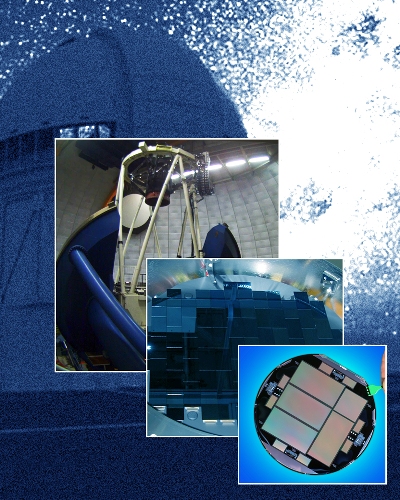By Kalwinder KaurSep 20 2012
Mounted atop the Victor Blanco Telescope at Chile’s Cerro Tololo Inter-American Observatory, the Dark Energy Camera (DECam) captured its first images of a southern sky gleamed with galaxies during early morning of September 12.
 "The Dark Energy Camera is mounted on the Victor Blanco 5-meter telescope at Cerro Tololo. Its focal plane consists of 62 large Berkeley Lab CCDs with exceptionally high sensitivity to the near infrared end of the spectrum. (Photos Roger Smith, NOAO, AURA, NSF; Blanco webcam; Fermilab; Roy Kaltschmidt, Lawrence Berkeley National Laboratory)"
"The Dark Energy Camera is mounted on the Victor Blanco 5-meter telescope at Cerro Tololo. Its focal plane consists of 62 large Berkeley Lab CCDs with exceptionally high sensitivity to the near infrared end of the spectrum. (Photos Roger Smith, NOAO, AURA, NSF; Blanco webcam; Fermilab; Roy Kaltschmidt, Lawrence Berkeley National Laboratory)"
DECam’s focal plane with an imager including Berkeley Lab-created 62 charge-coupled devices (CCDs) achieved images of galaxies beyond 8B light years.
With unique quantum efficiency, Berkeley Lab CCDs show high sensitivity to light in the red and infrared regions of the spectrum, serving as an ideal choice for astronomical CCDs exploring objects at extremely high redshifts. DECam has been designed with integration of the light-gathering power of the Blanco telescope’s 4-m mirror and the 570-million-pixel focal plane created with Berkeley Lab CCDs, and therefore effective for exploring the night sky.
Dark Energy Survey (DES) collaboration situated at the Fermi National Accelerator Laboratory developed the DECam. The amount of light in diverse colors from astronomical objects can be successfully measured using this photometric imaging camera. The main objective of DECAM is to evaluate the universe’s expansion history through collection of up to images of 300 M distant galaxies and 4,000 distant supernovae in five subsequent years.
Steve Holland of Berkeley Lab supervised the manufacture of the DECam CCDs. Unlike earlier astronomical CCDs, Berkeley Lab CCDs are robust. Measuring 250 µm in thickness, DECam CCDs ensure consistent high resolution across the spectrum, even in blue light. Photons strike the chip’s rear surface and create holes that are pulled anterior to the circuitry via an electric field produced by a bias voltage that permeates the overall thickness of the CCD.
Berkeley Lab CCDs are also effective in red light. The low dark current of Berkeley Lab CCD was improved through fabrication methods for ultrapure silicon.
Berkeley Lab’s industrial partner, Teledyne DALSA Semiconductor, and the Physics Division’s MicroSystems Laboratory were responsible for fabricating the DECam chips. Partially finished wafers having four CCDs that fulfilled 8 of 11 masking steps progressed to the MicroSystems Laboratory for completion, after being commercially thinned. “Cold-probe” tests at- 450 C were conducted and the CCDs were separated from the wafer and shifted to Fermilab for final testing and mounting of the science-grade devices.
DECam will generate the largest 3-D map of the universe, in addition to being adopted for the red channel of the SDSS-III spectrograph.
Disclaimer: The views expressed here are those of the author expressed in their private capacity and do not necessarily represent the views of AZoM.com Limited T/A AZoNetwork the owner and operator of this website. This disclaimer forms part of the Terms and conditions of use of this website.